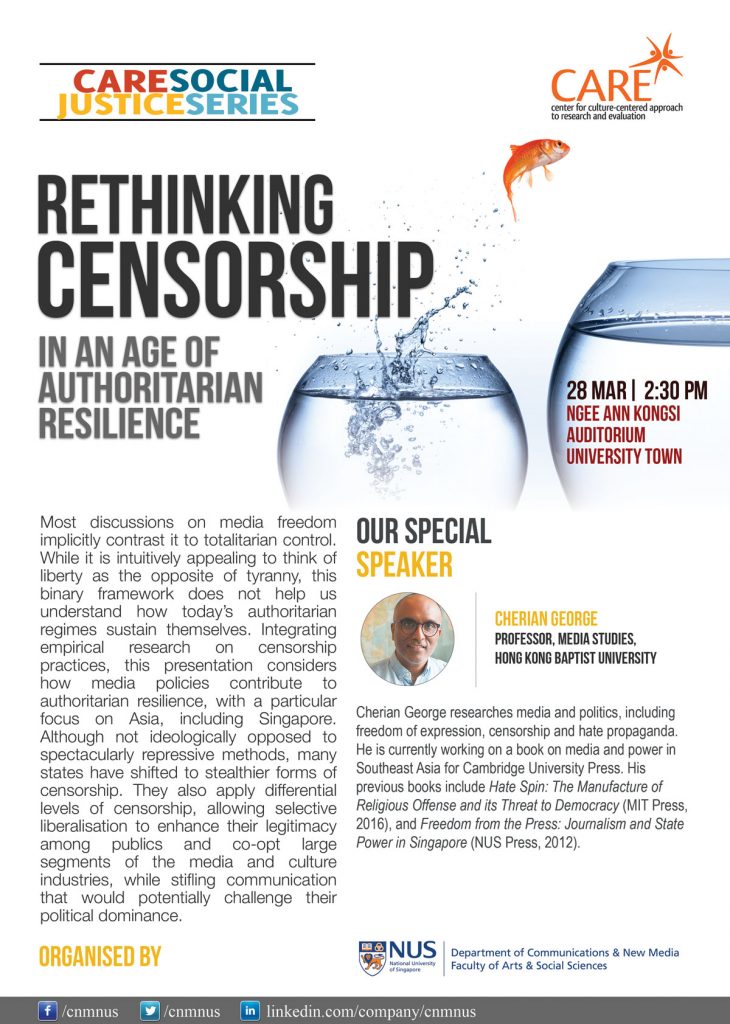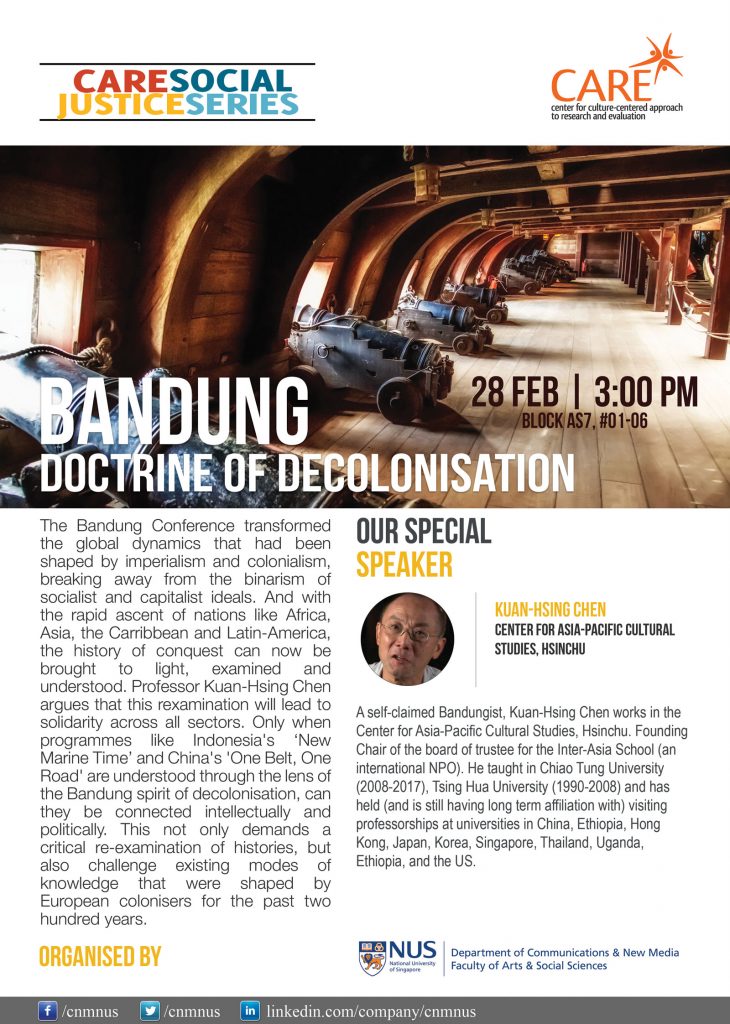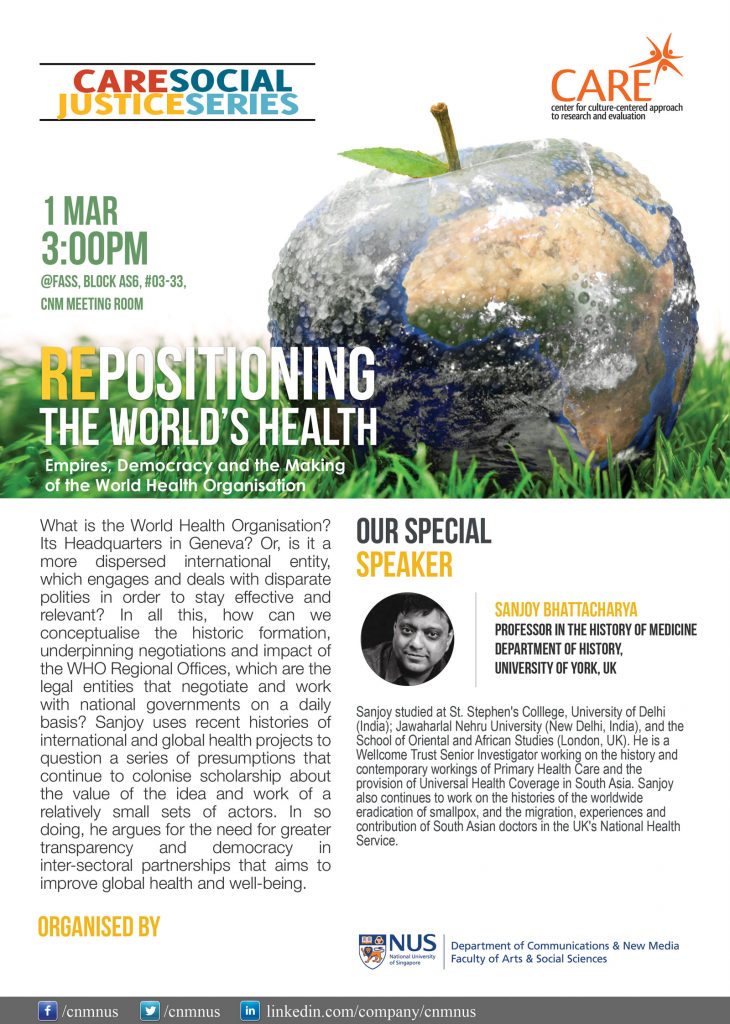OVERVIEW:
Building on the theme “Communicating for social change” of the 2014 conference of the Center for Culture-centered Approach to Research and Evaluation (CARE), the 2018 CARE conference foregrounds the role of communication in intervening into structures. Examining the ways in which structures organise social, cultural, political and economic systems, the theme Communication Interventions works theoretically, methodologically, and practically with the role of communication in catalysing, enabling, and implementing transformations. The various panels and keynote speeches in the conference attend to the diversity of theoretical modes through which communication intervenes into the world. The intersections of academia, activism, and community, the inter-plays among them, and the bridges that connect them, are explored in depth through the sessions. Panels showcasing CARE interventions attend to the conceptual terrains in which culturally-centering communication builds communication infrastructures from the margins. Workshops on specific elements of methods, collaborations, and publishing complement the theory-practice linkages that flow throughout the conference.
Conference Dates: 7 May – 10 May 2018
Conference Venue: Faculty of Arts and Social Science, National University of Singapore, Block AS6, #03-38, CNM Playroom
Registration is Free. Meals are not provided.
Register Online Now at: cnmn.us/cic
PROGRAMME:
Monday, 7 May:
| Time | Speaker | Topic |
| 10:00 am to 11:30 am | Sreekumar T. T | Opening Keynote: The Politics of the Cyborg: Some Thoughts on the Posthuman Debates Newly emerging concepts around the notion of cybernetic organism or cyborg challenge some of the conventional ideas about what it means to be human. An exploration of its manifold dimensions and its crucial impact on our political paradigms appear to be important in the multiple contexts of the wider social, cultural and philosophical questions that the debate has engendered. Particularly significant is the complexities of its rejection and/or reception from the perspective of social liberation. Cyborg takes us directly into the center of the debate of the posthuman, with important consequences for practicing philosophy of science in a conformist sense. This paper discusses some of the pertinent issues in this debate from both historical and political perspectives. |
| PART ONE: INTERVENTIONS AS ‘MAKING’ | ||
| 11:30 am to 12:30 pm | Jeremey Fernando, Liew Khai Khiun, Alex Mitchell | Panel 1: Community And Interventions Social Media and the affective digitalized communications of Animal Welfare in Singapore Dr Liew Kai Khiun, Nanyang Technological UniversityAbstract: This topic seeks to discuss the pivotal role in which social media has played in platforming the presence of animal welfare and rights advocacy in Singapore. Until the recent decade, the Society for the Prevention of Cruelty (SPCA), a venerable NGO established from the colonial era shouldered predominately issues on animal rights and welfare in Singapore, considered as the most disadvantaged and marginalized of social groups. Already severely stretched as an animal shelter, the SPCA’s lobbying efforts were limited in the face of the changing socio-cultural dynamics in Singapore as the agrarian economy of the postcolonial city-state urbanized rapidly. Some issues cover that of the archaic practice of systematic culling of strays displaced by infrastructure projects and reactions to epidemics, lax laws and enforcement in dealing with trafficking, abuse and neglect of animals from the booming pet industry, as well as the prohibition of ownership of cats and larger breeds of dogs in public housing estates. The 2010s have witnessed the emergence of a spectrum of registered and private groups in Singapore into the care and advocacy for animals in the republic. Classified commonly as Animal Welfare Groups (AWG) with new players and agendas on specific domestic animals and wildlife. In many respects, the internet and social media of especially Facebook have given activists and volunteers the critical public platforms in social mobilization through efforts of fundraising, providing even real time information for rescue and rehoming of individual animals, monitoring of individuals and institutions involved in commercial and regulatory bodies, and public advocacy for legislative reforms. Based also on the author’s personal involvement in AWG work for several years, the staging of animal welfare issues in social media brings out novel perspectives of affective digitalized communications by social movements in emotionalizing and amplifying the otherwise silenced non-human subjects. Resisting Art Abstract: In this performance-talk, I will attempt to respond to a call from Mohan Dutta to speak on, to write about, the possibility of art as resistance — that is, to meditate on the possible relationship between resistance and art. Whilst doing so, I will also try to attend to the notion that art is an encounter — between one and something that is brought forth in the movement from craft to something other than what is created through tekhnē. And, if so, it is always also potentially unknown, unknowable, until it happens, perhaps even after it happens. That, even as it might be experienced, felt — an encounter through aisthesis — it is quite possibly a moment beyond cognition; un pas au-delà, as it were. And if so, then perhaps all attempts to know it potentially do nothing other than to frame, to confine, its potentiality.Thus, perhaps the very thing that one has to do — if one is to attempt to maintain the possibility of resistance in art — is to resist what one thinks is art itself. Playing with Interactivity as a Poetic Device Abstract: Increasingly, we are experiencing a world mediated by digital media. There is a constant need to reassess the information we are presented with, and to understand the computational systems that we are using and are being used by every day. Examples include the often unexpected suggestions received from the autocorrect function on our smartphones, and the automatically “curated” information presented in our Facebook feed, both of which are driven by underlying algorithms that adapt to our actions. These complex underlying systems tend to remain invisible and uncontested. Building upon Shklovsky’s notion of defamiliarization, I will use a series of examples to argue that interactive stories, games and interactive art, by making unfamiliar those aspects of the systems that we have come to take for granted, can help us to pay attention to, critically reflect on, and potentially make sense of this complexity. |
| 12:30 pm to 1:30 pm | Lunch | |
| 1:30 pm to 3:00 pm | Debbie Dougherty, Editor, Journal of Applied Communication Research | Panel 2: Publishing Applied Communication ScholarshipAbstract: In this presentation, Professor Debbie Dougherty, Professor of Communication at the University of Missouri, Columbia, and the Editor of the journal Journal of Applied Communication Research will be sharing the process of transforming applied communication interventions into scholarship. Drawing on her own engaged scholarship on sexual harassment that has shaped global conversations on workplace policies against sexual harassment as well as on her key role as the editor of the field’s key journal for publishing applied scholarship, Professor Dougherty will share the challenges with publishing applied scholarship, the key qualities of good applied communication scholarship, and the ways in which challenges to publishing may be addressed by engaged scholars. |
| 3:00 pm to 5:00 pm | Asha Pandi, Anuradha Rao, Dazzelyn Zapata | Panel 3: Creating Digital SpacesState Power, Civil Society and Political Activism in Malaysia Asha Rathina Pandi Abstract: Civil society flourishes under conditions that include freedoms of speech and assembly. But, what happens when those conditions are lacking? Some say civil society cannot or does not exist in countries without constitutional guarantees. Others suggest that people find outlets for social and political interaction regardless of institutional restrictions upon civil society. This research explores the 2007 Hindu Rights Action Force (HINDRAF) and 2007-2016 BERSIH protest rallies in Malaysia where freedoms are limited, but where political unrest regularly challenges the state. With the Malaysian political structure labeled as a “semi-authoritarian,” and given tensions on ethnic relations, the social use of space not only carries strong political dimensions, but successfully limits the appearance of crowds in public spaces. Therefore, appropriated virtual space where actions stem from becomes a key driver in environments with limited civil liberties. This research reveals despite authoritarian power that limits civil society activism, not only civil society exists in Malaysia, but it has managed to carve out its space for activism through communication technology networks. This role, however, must be examined within a certain context – the specific circumstances, conditions, histories and actions of the various social actors and social movements. New Technologies and Implications for Civil Society and Democratic Engagement in India Abstract: In recent years, ‘traditional’ civic and political actors have been joined by newer, Internet-enabled actors in a wide variety of democratic engagement activities. This talk examines the ways in which information and communication technologies (ICTs) have influenced the evolution of newer civil society relationships, forms, actions, and spaces in urban India. Based on ethnographic research in Bengaluru, India’s ‘IT City’, as well as insights from ongoing investigations in this field, this talk highlights the implications of the rise of these newer civil society forms for both civil and political engagement. For instance, the rise of a more democratically engaged, English-speaking middle-class in urban centres has produced both new synergies as well as new tensions with older types of civil society actors. Such new relationships among and within civil society are among a host of factors that need to be more deeply examined to fully appreciate the implications of an internet-enabled civil society in India. Texting galatis and the ili: Narratives of indigenous civic engagement, collective action and the mobile phone Abstract: The Cordillera mountain range in the northern part of the Philippines is recognized as the traditional domain of the Igorot, or people of the mountains. In Mountain Province, Igorot community members use the term ili to refer to their hometown/community. It carries with it a strong emotional reference to their culture, of sharing the same practices, values, and tradition. Three indigenous communities- Panabungen, Besao; Payag-eo, Suyo, Sagada; and Guina-ang, Bontoc- inform this empirical paper on collective action and civic involvement as nuanced by their mobile phone use. Although this may be strikingly different from the digital activism that we see unfold on the internet, the paper lets us glimpse into how a traditionally off-the-grid community makes use of digital media for their community needs. |
| 5:00 pm to 6:00 pm | Raka Shome | Closing Keynote: When postcolonial studies interrupts media studiesAbstract: This talk examines how incorporating postcolonial frameworks interrupts media studies as it has been primarily conducted (in the West). The primary goal of this talk is to “interrupt” certain dominant assumptions and logics that inform media studies (including logics of temporality, and assumptions about what is a media ‘object’). The talk will also discuss why media studies should engage postcolonial studies and why media studies is uniquely positioned to engage postcolonial politics today. |
Tuesday, 8 May:
| Time | Speaker | Topic |
| 9:00 am to 11:00 am | Denisa Kera | Opening Keynote: Rethinking Plato in Indonesia and other CNM adventures between design and humanitiesAbstract: I joined the CNM department in 2008 to conduct a unique STS research combining philosophy with design to test and rethink the implications of various emergent science and technologies issues on society (nutrigenomics, consumer genomics, DIY science, biotechnologies, open hardware). I joined the informal networks of knowledge transfer and science and technology ‘diplomacy’ happening in the citizen science movement, makerspaces and hackerspaces around the world since 2009. I gathered evidence that such informal “diplomacy” creates unique South to South, but also South to North networks that address issues of knowledge justice, inclusiveness and democratization. I used examples of DIY laboratory equipment in Indonesia (2011, 2012), radiation monitoring kits in Japan (2013), open hardware innovation in Shenzhen (2014, 2015) to discuss how such activities go beyond research, reproducibility and corroboration in science, but also traditional ideas of innovation and development.The aesthetic, playful and expressive DIY culture involves artists, designers and various enthusiasts in what I call “artisanal” approach to science and technology that extend the purely epistemic (improving knowledge about nature) and normative (improving society) expectations of science and technology. They include open ended, creative explorations, but also civic aspirations that include small acts of disobedience and rebellion against the reduction of science and technology to bureaucratic administration, industrial interests and anonymous labour of some ‘big science’ agenda. The DIY “artisans” build instruments to regain sovereignty, dignity and freedom in an age immersed in science and technology. The alternative R&D settings of these activities and spaces engage the public with science and technology as a form of activism, but also leisure. To test some of these hypothesis about the DIY movement of science and technology artisans, I joined the OCSDNET network with a project on “Understanding Open Hardware and Citizen Science” (2015 – 2017). Through 2015 and 2016, we conducted seven workshops on low-cost, do-it-yourself (DIY), and open source tools (or “Open Science Hardware” – OSH) in Indonesia, Thailand and Nepal, which included a 10-day long workshop in Yogyakarta, five 1-2 day workshops in Bangkok, and a 10-day workshop in Kathmandu. The goal of the workshops was to understand how OSH instruments engage local communities in research and education, to which we had to add art, design and crafts, because of many creative (mis)uses of science instruments, which we witnessed on the ground. The open hardware creates conditions for politics to converge with design on a global scale and introduces political deliberation based on material, rather than purely discursive practices. In the present, I work on this convergence of politics and design that forces us to rethink our traditional views of governance based on the degradation of makers (demiurgoi) as political actors in Plato’s Republic. The blueprint of our governance ideals of separation of powers and various forms of “trias politica” degraded making and production as political activities. Politics since Plato’s Republic is opposed to making and designing and it is defined as a contemplative, cognitive and discursive achievement based on the right insight into the true nature of our soul and society. The present network of hackerspaces and DIY makers act as a utopian ‘republic of tinkerers’ that explores an alternative form of governance where prototypes lead to deliberation upon common future and global issues and where consensus is transformed into testing tools. With this preliminary genealogy of tinkering and making, I would like to rethink my work on hackerspace ‘governance’ as an experimental policy of prototypes which define citizens as not only voters delegating power, but also makers and regulators, as a “public of demiurgoi”. |
| PART TWO: DISRUPTING STRUCTURES | ||
| 11:00 am to 12:30 pm | Iccha Basnyat, Ashwini Falnikar, Somrita Ganchowdhury | Panel 4: Intervening into neoliberal structuresCulturally Centering Nepalese Female Sex Worker’s Experience to Explore the Intersections of Gender, Health, and Structural Inequalities Iccha Basnyat Abstract: I argue that the traditional attempts to reduce the prevalence health risks to female sex workers’ (FSW) narrowly defines health, and such communication efforts are focused on facilitating the reduction of individual risk prevalence. Based on 35 in-depth interviews, I use lived experiences of FSWs to discuss the relationships between gender, health, and structural inequalities. Through my work, I argue that centralizing gender enables us to recognize the societal conditions and patterns that creates and sustains inequalities in women’s lives allowing us to examine the impact on health as well as explore the specific mechanisms that reinforces these inequalities. I further argue that health of women, particularly marginalized women, must be understood within the multiple intersections of the women’s lives rather than a standalone discussion of individualized health such as STI/HIV, condom negotiation, limited partner all of which places the onerous simply on the women themselves rather than understanding the social context within which her decision resides. Ultimately, through my research I urge us to locate the discussion of health of marginalized women within the socially constructed cultural context, while paying attention to the gendered inequalities, labor divisions, power relations, and proscribed sexual norms that impacts health and health decision making. A Critique of HIV and Aids Policy Abstract: This study seeks to interrogate the neoliberal logic embedded in the discursive construction of the annual report of the National AIDS Control Organization (NACO), which is the nodal organization for policy formulation and implementation of National AIDS Control Programme (NACP) in India. This study looks at how the construction of the human immunodeficiency virus (HIV)/acquired immunodeficiency syndrome (AIDS) as an individualized behaviour-based disease maintains the global hegemony of neoliberal governmentality. In the light of understanding the neoliberal agenda underlying the framing of HIV/AIDS and the material interventions that are mobilized around it, this article analyses the NACO reports examining the goals, objectives, taken-for-granted assumptions, and issues that remain absent from the discursive space. BT Cotton and the Voices of the Widows in the Face of Farmer-suicides Abstract: The post-liberalization agriculture is marked by an epidemic of farmer suicides in India. Amid the dominant discourse of dissemination of new agricultural technology of Bt cotton aided by communication framework of dissemination of messages for marketing of agricultural technologies, the voices of the farmers remain erased. Salient in the backdrop of high-yield narrative of Bt cotton are the everyday constructions of suicides among the farmers. The voices of the farmers disrupt the monolithic construction of the agricultural technologies as tools of modernization and progress. This article draws on the voices of the women in agrarian households that are especially salient amid patriarchal representations of decision-making in agriculture. |
| 12:30 pm to 2:00 pm | Lunch | |
| PART THREE: ACADEMIC-ACTIVIST INTERVENTIONS | ||
| 2:00 pm to 3:00 pm | Braema Mathi | Panel 5: Conversations with CARE’s Activist CollabaratorAbstract: The veteran Singaporean activist Ms. Braema Mathi has been a key activist collaborator in the work of CARE, helping build community networks and anchors for capacity building in the realm of communication for social change. In this conversation, she will reflect on her experience with activism in Singapore, the history of activism and communication in Singapore, the changing landscape of communication activism in Singapore, and the ways in which this changing landscape has negotiated the ongoing challenges to activism amid Singapore’s soft-authoritarian policies. |
| 3:00 pm to 4:00 pm | Satveer Kaur, Mohan J. Dutta | Panel 6: CARE Interventions Showcase 1- Respect Our RightsAbstract: In this Interventions Showcase, the CARE research team will highlight the work of the “Respect our Rights” campaign launched by CARE. Based on culture-centered dialogues with foreign domestic workers in Singapore, the project seeks to create a communicative infrastructure for foreign domestic workers that disrupts the spaces created in the ambits of state, civil society, and market. The voices of the foreign domestic workers foregrounded in the discursive registers disrupt the narrative anchors circulated in the mainstream, offering alternative narratives of hope and imagination. These narratives create conceptual anchors for articulating rights from the global margins and amid the sites of neoliberal production in the Asian cosmopolis. The project foregrounds the nature of social change communication amid migration and global flows, suggesting pathways for disrupting authoritarian modes of neoliberal reproduction. |
| 4:00 pm to 5:00 pm | Naomi Tan, Asha Pandi, Mohan J. Dutta | Panel 7: CARE Interventions Showcase 2- Singaporeans Left BehindAbstract: The “Singaporeans Left Behind” advocacy campaign, developed by an advisory group of Singaporeans living in poverty interrupts the erasure of poverty from mainstream discursive spaces in Singapore. Through their participation in communicative infrastructures, community members articulate anchors to advocacy. These narrative entry points resist the obfuscation of poverty in the mainstream. In the presentation, we will outline the communicative processes in the development of the advocacy strategies, the structures that constituted the work of advocacy, and the negotiations of these structures. |
| 5:00 pm to 6:30 pm | Deborah Dougherty | Closing Keynote: Sexual harassment and communication interventions that workAbstract: Sexual harassment has been an ongoing problem in Western style workplaces for many years and is considered to be illegal behavior in most of the developed world. Most remediation efforts focus on the legal dynamics of this behavior, using organizational policies and training as the primary response. While necessary, this response is inadequate to solve this wicked problem in the contemporary workplace. Instead, it is necessary to understand sexual harassment as a complex communication problem interwoven with social, cultural, and organizational norms and assumptions. This presentation focuses on the ways in which social assumptions about gender and sexuality make organizational members unable to recognize sexual harassment when it occurs. Effective bystander intervention will be discussed. |
Wednesday, 9 May:
| Time | Speaker | Topic |
| 9:00 am to 10:30 am | Ingrid Hoofd | Opening Keynote: Paulo Freire’s Promise: A Critique of the Bottom-up Communicative Educational IdealAbstract: In the Western as well as non-Western context, the work of Paulo Freire has generally been lauded as signifying a provision of communicative and educational empowerment for non-Western marginalised populations through advocating a restructuring of the higher educational setting via so-called ‘bottom-up’ learning and the use of then-new media. While partially noting the merits of Freire’s approach, this talk nonetheless also traces this ‘alternative’ pedagogical and communicational method that Freire proposes back to the onset of technological acceleration and a qualitative shift in global capitalism from the turn of the twentieth century onwards. It illustrates this by working through Paulo Freire’s famous Pedagogy of the Oppressed, arguing that this work is symptomatic of the cybernetic acceleration of the ideals of the university after the Cold War from which e-learning initiatives also emerged. During this period namely, the sympathetic argument for ‘bottom-up learning’ through new media starts to conceal how authority becomes increasingly networked and stealth, eventually functioning to insert ‘the oppressed and marginalised’ into the accelerated economy for the benefit of the global elites. |
| PART FOUR: AUTOMATION AND INTERVENING INTO THE DIGITAL | ||
| 10:30 am to 12:00 nn | Julian Lim, Renyi Hong, Itty Abraham, Taberez Neyazi; Moderated by Eric Kerr | Panel 8: Fourth Industrial RevolutionFuture of Human Communication- with Artificial Intelligence Julian Lin Abstract: With the introduction of smartphone, our lives has changed dramatically. Nowadays, human spent more time with smartphones than with their counterparts. A survey reported by Straits Times showed that Singapore spend over 12 hours on gadgets daily. With the introduction of smart home assistant with AI capabilities, human will spend even more time with technology. This session will look at the current state of smart home assistant with AI capability, the capability of artificial intelligence to learn, and predict data accurately, as well as, what the near future will possibly be. Impacts on society will be discussed. Bearability and the Politics of Self-Erasure Abstract: This paper makes an argument about bearability: the capacity of media processes to enable possibilities of endurance for laboring subjects of structural precarity. I enter this topic by bringing up a recent article by the Financial Times which rai |





